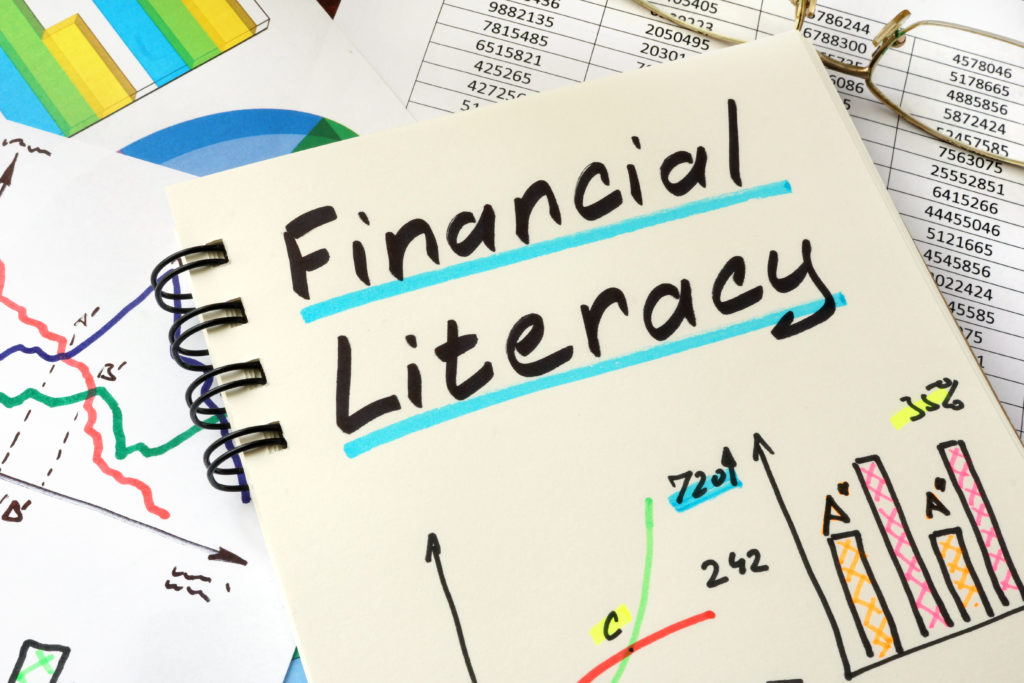
Nothing makes a person feel more uneasy than not understanding how to spend, invest, and save money correctly. Bad money habits can be created early in life, mainly learned from our parents. Financial instability can create a world of stress for you, whereas a strict budget can create a sense of calm and understanding of what’s to come and even prepare you for unforeseen circumstances.
What Is Financially Literacy?
Financial literacy is really about getting you to develop a strong understanding of basic financial concepts. With these basics under your belt, the goal is to get you to make intelligent decisions with your income. This is a skill you will need to learn sooner rather than later, especially with the current state of our economy. According to reports, with inflation hitting our economy especially hard, 64% of Americans are currently living paycheck to paycheck…that is nearly two-thirds of the nation! That statistic is very telling. Because they are living paycheck to paycheck, there is a very good chance a lot of Americans do not have the opportunity to save money for their future. It also means that debt is a common denominator in many households.
The word “literacy” can make the concept of financial literacy appear overwhelming, but it is not. Remember that while it’s important to understand best money practices, it only works to your benefit if you actually execute them. Consider it EMPOWERMENT!
Financial Literacy Basics
You can take a deep dive into financial literacy and learn topics including investments, stocks, 529 plans, etc., or you can start with the basics…budgeting, saving, and investing.
Creating a Budget
Making a budget is a straightforward concept that is easy to grasp. However, honoring that budget is an entirely different story. With a budget in hand, you can better understand the amount of money coming in each month vs. the amount of money going out on things like utilities.
You will want to include all of your monthly expenses in your monthly budget, including your mortgage or rent, utility bills, and credit card payments. You will also want to make sure to budget for groceries and any entertainment. You must do your best not to overspend.

Pay off Your Debt
Paying off debt is no easy feat. It requires sacrifice, like eating out less and opting to spend a relaxing night at home rather than spending money on a night out with friends. However, these sacrifices could quite literally pay off in the end.
According to the Federal Reserve Bank of New York, in 2018, the total consumer debt in the United States was more than 3.9 TRILLION dollars. Nearly half of all Americans spend half of their monthly income on debt payments. Reducing this percentage can be difficult unless consumers make a concerted effort to pay off the debt. Your time paying off your debt directly impacts your ability to save and invest for your future.
Check out our blog post Debt Relief Options: What You Should Know for a more in-depth read.
Open a Savings Account
If you have any money left in your budget, you might want to consider pushing that into a savings account. Some people do not feel that they have enough money in the bank to warrant a savings account. This is not the case. Even small contributions to your savings account can add up over time. The pride you feel as you watch your savings account grow is a wonderful feeling.
Having a dedicated savings account may also eliminate some of the temptations you might face by keeping those extra funds in your checking account. Set a short-term goal and a long-term goal. Before you know it, putting money into savings will become a habit that will pay off for years to come.
Some other points to consider…financial experts recommend having at least 3-6 months’ worth of living expenses saved up. This is most helpful in case of sudden job loss or other unforeseen circumstances.
Create an Emergency Fund
Speaking of unforeseen experiences, emergency expenses are never fun and are made even more stressful if you are not prepared financially. In addition to putting money into savings, you may want to build up an emergency fund of $1000. This money is beneficial if an unexpected medical bill arises or if your car breaks down. That extra cushion will give you peace of mind.
Deeper Financial Dive
Again, the above points are a great starting point. As you become more financially literate, you can begin to learn more complex concepts, including compound interest, interest rates, and investment options, including IRAs, 401(k), etc. There may not be a pension to fall back on in retirement for many Americans. It is up to you to figure out your financial future and plan accordingly.
Financial Education
Where can you learn more about financial literacy? There are several free resources online that can teach you the basics or even more complicated concepts. In addition, you can always check with your employer to see if they have any financial wellness classes available to you. Credit counseling may be another good option. They can help you come up with a plan to pay off your debt and explain how interest rates impact you and your payments.
Remember, do not overwhelm yourself all at once. It is important to take baby steps in this process so you can fully grasp how your money comes in, is spent, and is eventually invested. Financial literacy gives you the confidence you need to make sound financial decisions. You can get there one step at a time.
High-interest loans can be expensive and should be used for short-term financial needs only, not as long-term solutions. Customers with credit difficulties should seek credit counseling. Cash Factory USA does not provide financial advice. Visit
Image(s) or Footage (as applicable), used under license from Shutterstock.com.